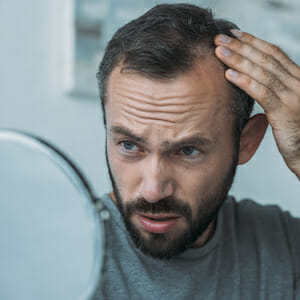Hair Loss Awareness Month: What Causes Hair Loss After COVID-19?
- Posted on: Aug 6 2021
 If you’ve suffered noticeable hair loss during the COVID-19 pandemic, you’re not alone. Hair loss is among one of the many unexpected problems people have experienced after having COVID-19.
If you’ve suffered noticeable hair loss during the COVID-19 pandemic, you’re not alone. Hair loss is among one of the many unexpected problems people have experienced after having COVID-19.
August is National Hair Loss Awareness Month, and there’s no better time to talk about all things related to hair loss. If you are concerned about hair loss, the dermatologists at Asarch Dermatology are available to help you learn more about hair loss causes, hair loss treatment for men, and hair loss treatment for women.
What Causes Hair Loss After COVID-19?
Currently, there is no evidence indicating that a COVID-19 infection is a direct cause of hair loss. Instead, doctors think that the physiological and emotional stress that is brought on by COVID-19 leads to a condition called stress-induced telogen effluvium. It develops when hair enters the resting phase of the hair growth cycle, which is called the telogen phase. This shift in the hair growth cycle causes you to lose more hair than normal.
A fever, illness, or emotional distress can cause hair to enter the shedding phase, with most people experiencing noticeable hair shedding within two to three months after the triggering event. When brushing or washing your hair, you might notice clumps or handfuls of hair coming out. The hair loss can be dramatic with some people losing around 300 hairs a day.
So, how can an illness or a stressful event lead to telogen effluvium? When the body is under stress or experiences a shock to the system, it must focus on essential functions that are dedicated to healing and repairing. Since hair growth isn’t an essential function, this can lead to excess hair shedding.
To diagnose stress-induced telogen effluvium, your dermatologist must first eliminate other potential hair loss causes. These include hormonal changes, such as those occurring during puberty, menopause, and pregnancy, a family history of hair loss, significant weight loss, certain medical problems, such as lupus or diabetes, strict dieting, or poor nutrition, including a diet low in protein and iron.
When Does Hair Grow Back?
If you have been diagnosed with telogen effluvium and are experiencing hair loss as a result of illness, fever, or stress, the good news is that this type of hair loss is only temporary. For many people affected by telogen effluvium, your hair will grow back over time and return to normal on its own. According to the American Academy of Dermatology, most people with telogen effluvium will see their hair return to its normal fullness within six to nine months. You’ll know your hair is growing back when you start seeing short hairs around your hairline.
If you have another type of hair loss, it may take longer for hair to regrow. This is typical for the patchy hair loss that occurs with alopecia areata, which may take a year for hair to regrow without treatment.
Hair Loss Treatment
Although hair loss caused by telogen effluvium improves over time, you can talk to your dermatologist about hair loss treatment options that can improve hair growth.
It’s important to focus on developing healthy habits, such as learning how to manage your stress levels and eating a nutrient-rich diet. You can also talk with your dermatologist about whether you’d benefit from a biotin or vitamin D supplement or a diet high in iron and protein. Using a gentle shampoo, applying conditioner to your hair after washing, avoiding heat styling tools, avoiding hairstyles that pull on your hair, and brushing or combing your hair gently can help you better manage hair loss.
If you’ve been shedding hair and it’s not showing any signs of improvement after six months, make an appointment to see one of our dermatologists. Options for hair loss treatment for men or hair loss treatment for women may include a prescription for minoxidil. This treatment is applied to the scalp and may help slow the rate of hair loss and promote hair growth.
Your dermatologist may also recommend a hair transplant system or light therapy treatment to restore growing hair and improve the overall health of your hair. Dietary supplements may also promote hair growth and provide the nutrients needed to achieve healthy hair.
Whether you’re looking for hair loss treatment for men or hair loss treatment for women, we offer numerous treatment options designed to promote hair growth. Hair Loss Awareness month is the perfect time to seek hair loss treatment so you can regain your confidence. Schedule your consultation today to learn more about which treatment may work best for you.
